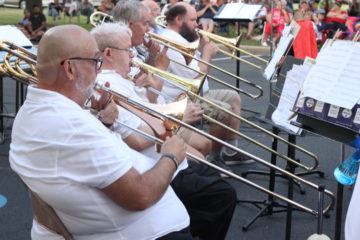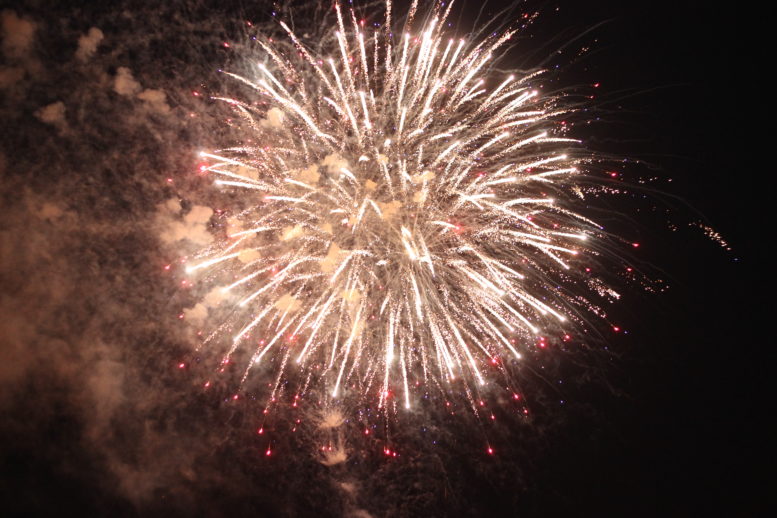By JAN LARSON McLAUGHLIN
BG Independent News
Freedom of speech, freedom of religion and freedom to eat ice cream? Well, two out of three beats the national average.
While the fireworks were being prepared, and the community band was tuning up for the Independence Day concert, people gathering Monday evening for the festivities in Bowling Green talked about the freedoms guaranteed to them in the Constitution.
Some were bona fide Constitutional amendments. Others were rights supported by legislation. And some were just wishful thinking.
But overall, the crowd gathered for the July 4th concert was above the national average in their Independence Day and American history knowledge. After all, we live in a nation where some citizens believe “Judge Judy” is a member of the Supreme Court.
“Seventy-nine percent of people don’t know who we got our independence from,” lamented Joyce Kepke as she carried her lawn chair for the fireworks viewing. Kepke’s favorite Constitutional amendment gave women the right to vote – the 19th Amendment. Her “biggest disappointment” was that the Equal Rights Amendment still has not been enacted.
Some of the 27 amendments are more familiar than others. The 1st Amendment guarantees freedoms of speech, press and religion, plus protects the right to petition the government. The 2nd Amendment, another oft-cited one, guarantees the right to own and bear arms for defense. And the 13th Amendment banned slavery.
The 18th Amendment banned the sale and consumption of alcohol. But that all changed with the adoption of the 21st Amendment which repealed the ban.
Many of the amendments are much more obscure, such as the one stating citizens cannot be forced to quarter soldiers during times of peace. Oddly enough, no one mentioned that amendment Monday evening as their favorite.
Freedom of speech ranked in a solid first place among concert and fireworks fans.
“The 1st Amendment. I think it’s important to voice what you think,” said Steve Deutschman.
Ruah Buckingham shared that sentiment, but also expressed concerns about free speech. “I’m not too sure that we really have that anymore,” she said. “You need to think what you say before you say it.”

Trombone section of the Bowling Green Area Community Band
Beverly Miner had difficulty narrowing it down to one particular freedom. “There are so many,” she said. But she settled on “freedom of speech,” then added her mind was focused on “freedom of vacation” at the moment.
Andy Drumm referred to it as freedom of expression.
“It’s important to me because everyone has a different opinion and it’s important that we hear them – whether we agree with them or not,” Drumm said.
Doug Stoots echoed those thoughts.
“You can express your thoughts and feelings without fear of retaliation,” Stoots said.
Matt Reger, a Wood County Common Pleas Court judge, said the 1st Amendment also ranks at the top for him, noting that it actually covers six different freedoms – the right to free speech, the press, to assemble, expression of religion, establishment of religion, and petition the government.
“I think those are the ones that are so important,” Reger said.
Doug Kaufman added a twist to his version of the 1st Amendment. “I like to have the right to say what I want, but not for you to say what you want,” he said with a grin.
Some people talked about rights held dear in the U.S. that some places in the world only dream of having.
Carla Gonyer values the right to vote. “Being able to say what I want, and what I want in the world,” by casting her ballot.
Betty Whitacre appreciates the freedom of movement in the nation. “You’ve got freedom to make your own choices,” she said.
“You can make your own stupid mistakes,” but at least people have that freedom, Elaine Kaufman said.
“Freedom to not live in fear,” Jack Whitacre added.
Along those same lines, Greg Kegler said Americans are free to make their own choices – even if that’s not directly addressed in the Constitution. “We get to do whatever we want to do.”
Ellen Dalton spoke of the “freedom of choice,” though not in the Constitution, it is secured by a Supreme Court ruling.
Drew and Jocelyn Headley talked about freedom of religion and the general belief in freedom in the U.S. “America’s freedom is where it’s at,” Drew Headley said.
Jo Ascunce agreed about the importance of religious freedom. “When you see what’s going on in the world,” it makes America’s 1st Amendment stand out. “Anyone can worship the way they want to,” in the U.S., Raul Ascunce added.
But after thinking about it, Raul Ascunce proposed a 28th amendment – a freedom that could draw a lot of support – free ice cream for all.




